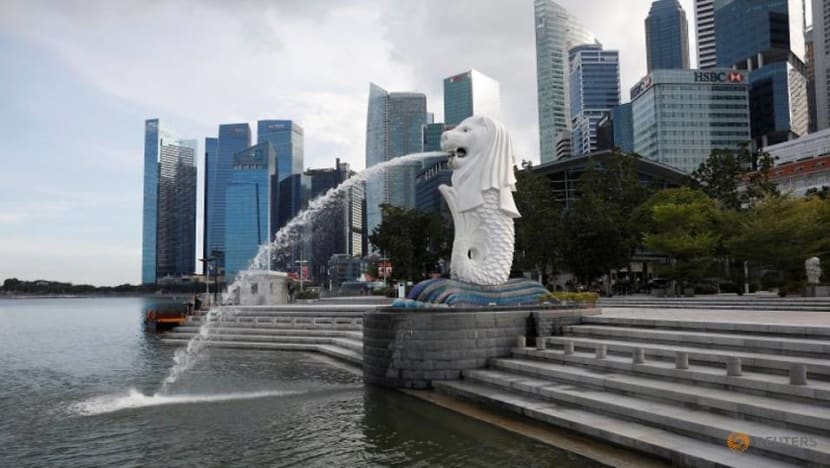Going virtual: COVID-19 pushes tourism players, visitors to adapt to a new reality
Tourism has been one of the sectors worst hit by the COVID-19 pandemic. With closed borders and restrictions, many tourist attractions have seen a steep downturn in business. To keep afloat, many are turning to technology. Money Mind reports.

A water feature is seen in an empty Merlion Park, as tourism braces for a steep decline following the outbreak of coronavirus disease (COVID-19) along Marina Bay in Singapore on March 26, 2020. (Photo: Reuters/Edgar Su
SINGAPORE: Since late March, Singapore’s borders have been shut to most short-term visitors.
This has had a significant impact on tourism numbers - in June, Singapore received just 2,170 visitors, a far cry from the 1.55 million tourist arrivals seen last year.
That is a 99.9 per cent drop.
This harsh reality is very much on the minds of those charged with promoting Singapore as a tourism destination.
With a limited number of potential customers who live in Singapore, companies here have had to quickly adapt and innovate to spin off new revenue models, said industry players.
READ: Tourism spending down 39% to S$4 billion as visitor numbers to Singapore plunge in Q1
READ: Retrenchments in tourism industry are 'inevitable' without resumption of mass market travel, says Chan Chun Sing
“As much as we try to drive local consumers to the market, the reality is, there are only 5.5 million people in Singapore. We had 19.1 million visitors last year. It’s a very big gap," said Mr Quek Choon Yang, chief technology officer at Singapore Tourism Board (STB).
"We are cognisant that it’s not going to be (possible) to cover the entirety of the revenue lost from international visitors. But what tourism businesses can do is then to think about new business models, new experiences and services,” he added.
MAKING USE OF DATA
STB has been working with technology company Adobe to help businesses and attractions with this digital transformation.
This includes providing them with assistance to create virtual experiences and activities, and using data analytics to create bespoke experiences.
The STB calls it the One Singapore Experience, which is aimed at providing a seamless and personalised experience for those who visit Singapore.
“The smart thing is to take this data, when people are engaging with that content, and use it to understand what works, what doesn’t work, and how you can improve delivering that content to the same people in a different way or learn from the groups that form around particular content and amplifying that so that you can get a better return from it," said Mr Simon Dale, managing director for Adobe in Southeast Asia.
"It’s a combination of getting the content right, but also delivering and engaging with that content in the right way,” he added.
READ: Here’s what the animals at the Singapore Zoo are getting up to while no one’s around during the circuit breaker
TOURING THE WORLD, VIRTUALLY
One organisation that took this message to heart is Wildlife Reserves Singapore, which manages Jurong Bird Park, Night Safari, River Safari and Singapore Zoo.
During the "circuit breaker", they launched a customised virtual experience called Hello From The Wild Side.
The virtual outing includes exclusive behind-the-scenes look at an animal of their choice, and the opportunity to chat with the animal’s keeper.
According to Wildlife Reserves Singapore’s deputy CEO Cheng Wen Haur, the response from the public has been so positive that the zoo will continue with the virtual programme, even though it was allowed to reopen in July.
READ: Going on a Zoom date with Moe the capybara from Singapore's River Safari
Another virtual activity organised by WRS was inspired by home-based learning.
Since schools have had to cancel their zoo visits, the zoo brought the animals to the students – online.
Dr Cheng said WRS is now looking to expand this school programme to other countries such as India or China, discovering a previously untapped market.
This, experts said, is one of the benefits of virtual tourism – being able to reach out to groups that would not otherwise have had the opportunity to visit a particular country.
Mr Kenny Liew, an analyst at Fitch Solutions, said that virtual tourism could be especially appealing to older travellers and those with mobility issues.
"The other group that we see is students. (Operators could provide) personalised itineraries for schools at a fraction of the cost that the schools would actually have to spend to physically bring the entire group of students there.
READ: FAQ: What you need to know about the SingapoRediscovers vouchers
READ: Looking forward to your S$100 tourism voucher? Here are some experiences you may want to explore
DANCING IN THE CLOUD
Another company that innovated during the circuit breaker was Zouk
With nightspots closed under circuit breaker measures, Zouk started live streaming their DJs’ sets – something it calls cloud clubbing.
Zouk Group CEO Andrew Li said this then evolved into a full lifestyle portfolio that included interviews with DJs, fitness and yoga sessions as well as cocktail-making classes.
For now, stakeholders say it is too soon to tell if virtual visitors can make up for the downturn in tourism revenue.
But with borders still mostly restricted in many parts of the world, joining the digital club means not just new audiences, but also an expansion of brand offerings and identities.
BOOKMARK THIS: Our comprehensive coverage of the coronavirus outbreak and its developments
Download our app or subscribe to our Telegram channel for the latest updates on the coronavirus outbreak: https://cna.asia/telegram















